How Meesho's big, bold bets took it close to $5-billion valuation at lightning s
The speed of app downloads has been equally matched by the startup's pace of funding. Can the internet commerce platform maintain the momentum?


 Meesho cofounders Vidit Aatrey and Sanjeev Barnwal
Meesho cofounders Vidit Aatrey and Sanjeev Barnwal
October 2015, Koramangala, Bengaluru
The shopaholic duo arrived around noon. It was a bright Sunday afternoon, and the local neighbourhood market was steadily swelling up with a rousing stream of festive crowd. Though with deep pockets, most of the buyers were bargain hunters. Standing cheerfully outside a garment’s store, Vidit Aatrey and Sanjeev Barnwal had their pockets loaded. The IIT grads were patiently waiting to strike a deal. “Please don’t come here," the duo pleaded to a shopper who just entered the store. The shopkeeper looked bemused.
Aatrey, though, flashed a broad smile. Possessed with a missionary zeal, he took out a pamphlet from his pocket and handed it over to the customer. “Don’t shop from here," read the leaflet. “Please visit our app to buy fashion products" was the message conveyed to the perplexed buyer. “You will find this shop on our app," he informed politely. Over the next couple of hours, the friends continued with their passionate plea to persuade shoppers not to shop from the store. “No one was coming to our app," recalls Aatrey, who had rolled out Fashnear, a hyperlocal fashion discovery platform, along with Barnwal a month back. “And we didn’t know how to get people to our online app."
Meanwhile, the offline gambit to get people online continued. Markets kept changing—at times the venue was a shopping mall—but the methodology remained the same: Targeting one shop a day. For the lucky ones who did come online to place an order, the enterprising duo figured out one more ‘wow’ service: The ‘try-and-buy’ option. Both used to go to a shop, pick up a product and then deliver it to the customer. “We"d stand outside the house, and wait for feedback," recounts Aatrey.
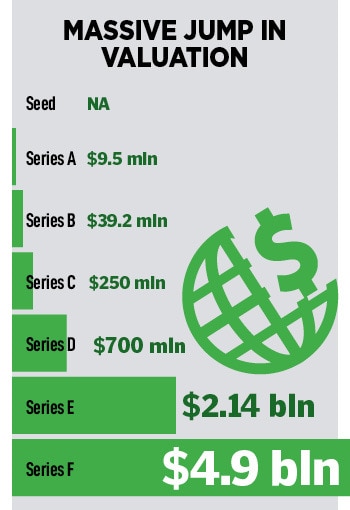 After four months, the duo lost steam. The business didn’t scale, and consumers exhibited muted interest. Reason was simple. In fashion, Aatrey underlines, people want a wide range of options and having products just from a local market was not what the doctor ordered.
After four months, the duo lost steam. The business didn’t scale, and consumers exhibited muted interest. Reason was simple. In fashion, Aatrey underlines, people want a wide range of options and having products just from a local market was not what the doctor ordered.
The approach changed, but the battle continued. Now the small shoppers were gunning to get insights into how they work, identify their pain points and come up with a silver bullet. For days, the duo would do nothing but sit in a shop and diligently observe the shopkeeper’s behaviour.
The Aha moment came at Estilo Canta, a garment store in Koramangala. The owner used to take the WhatsApp number of all customers, add them to his group, and keep posting all new products. Interested shoppers would place their orders on WhatsApp, and the shopkeeper would deliver. “About 40 percent of his sales was coming from his WhatsApp group," informs Aatrey, who discovered a pattern among shopkeepers. Most of them were using WhatsApp for business.
The duo spotted a business opportunity. The friends knew managing commerce on the messaging app was not easy. Shopkeepers kept a separate log to record every order most of the times they were out of stock while the order had been placed, leading to bad customer experience and cash on delivery turned out to be a big pain. Online payments meant adding bank details of individual customers and UPI had not taken off. “All this was a big hassle," says Aatrey.
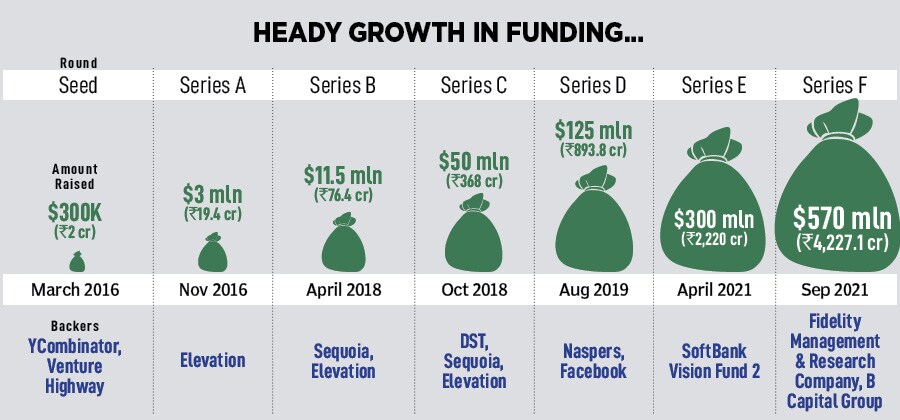
The solution devised was simple. Fashnear got transformed into Meesho—meaning ‘meri shop’ (my shop)—and the duo now dangled the app to the shopkeepers. “We created a beautiful app," recalls Aatrey. It was simple to use, add products, and could be easily shared on WhatsApp, Facebook and Instagram. The friends stormed all the flea markets in Bengaluru. This time the pamphlet handed out to scores of shopkeepers read: “Please use this app, and manage your business." The ritual continued for a few months. Though the response was better than their last app, the Meesho app didn’t take off the way the co-founders had envisioned. The adoption was not fast. Speed was missing.
The energetic duo went back to the drawing board again. This time, the task was to do data mining to figure out the users of the app. “Most of them were women, and homemakers," says Aatrey, who started visiting users to find out why Meesho was a blockbuster app for them. Enlightened with the insight, he approached his friend to build another version of the Meesho app for resellers. Barnwal, though, was in no mood to oblige. He was drained out by the exhaustive tech and coding perseverance over the last few months. This time he wanted the proof of the pudding before taking the plunge.
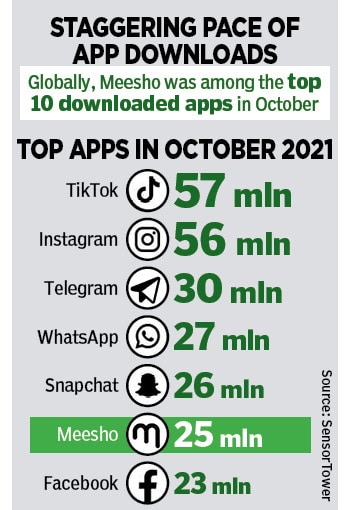 Aatrey figured out a jugaad. He used WhatsApp and Google spreadsheet to run the app. “We created a WhatsApp group and added all these homemakers on a daily basis," he recalls. The plan was to give them access to all the supply that Meesho had on its platform, and let the micro entrepreneurs sell them. The logistics too was taken care by the social commerce platform. For four months, the business ran on WhatsApp. “In four months, the business doubled every month," he says. And this was happening without any new app or website, no coding and zero marketing. Barnwal was convinced. Now the team rolled out a new app. “This was Meesho 2.0," says Aatrey “We were confident of a good show."
Aatrey figured out a jugaad. He used WhatsApp and Google spreadsheet to run the app. “We created a WhatsApp group and added all these homemakers on a daily basis," he recalls. The plan was to give them access to all the supply that Meesho had on its platform, and let the micro entrepreneurs sell them. The logistics too was taken care by the social commerce platform. For four months, the business ran on WhatsApp. “In four months, the business doubled every month," he says. And this was happening without any new app or website, no coding and zero marketing. Barnwal was convinced. Now the team rolled out a new app. “This was Meesho 2.0," says Aatrey “We were confident of a good show."
Fast forward to 2021. Last month, Meesho was globally among the top 10 downloaded apps. In fact, it pipped Facebook by getting 25 million downloads in October, according to the latest report by SensorTower. While TikTok topped the chart with 57 million, Meesho was seventh in the pecking order. Facebook came next with 23 million downloads (see box).
The speed of app downloads has been equally matched by the pace at which Meesho has grown in funding, valuation and scale. Between Series A and Series C round of funding—roughly a year from November 2017 to October 2018—the valuation jumped from $9.5 million to a staggering $250 million. The funding during the same period increased from $3 million (around Rs19.4 crore) to $50 million (around Rs368 crore).
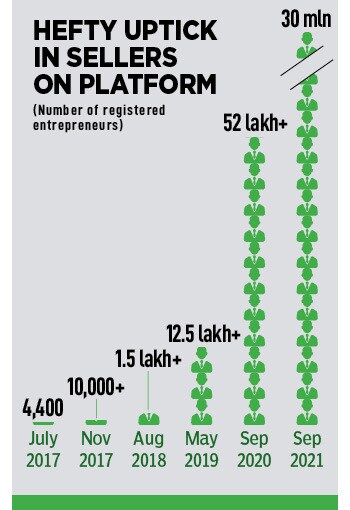 Interestingly, Meesho was about to enter into a different trajectory. In Series D, its valuation jumped to $700 million in 2019, and Meesho becomes Facebook’s first India investment. Early this year, in a Series E round in April, the valuation soared to $2.14 billion. Five months later, Meesho got valued at $4.9 billion when it raised its Series F round in September.
Interestingly, Meesho was about to enter into a different trajectory. In Series D, its valuation jumped to $700 million in 2019, and Meesho becomes Facebook’s first India investment. Early this year, in a Series E round in April, the valuation soared to $2.14 billion. Five months later, Meesho got valued at $4.9 billion when it raised its Series F round in September.
The pace at which users and orders have galloped is equally stunning. In February 2019, Meesho claimed to have 209K (209,000) users, and 1.2 million orders. In March 2020, the equivalent numbers were 563K and 3.1 million, respectively. In September, the numbers stood at 17,800K and 51 million. Interestingly, Aatrey points out at a data which got buried underneath millions of users and billions of dollars. “We are the fastest to reach close to $5-billion mark in valuation," he claims. “There is no one who has done this in such a short span of time." The next big, and hyper ambitious, goal is to get 100 million monthly transacting customers by December 2022. “We all are hungry and ambitious," he asserts. The phrase, ‘go big or go home’, he lets on, explains the DNA of the startup. “It keeps pushing us to take bold bets," he adds.
The backers are cheering every bit of lusty growth. “This is Meesho 3.0," says Mukul Arora, partner at Elevation Capital. The venture capital (VC) fund was the first institutional investor to back the social commerce platform which is now morphing into an ecommerce marketplace which still retains a strong element of social commerce. “They"ve done a phenomenal job, and are on a very solid pitch," he says. Ecommerce 1.0, Arora underlines, was built on web browsers, while the second version was founded on mobile apps. The latest avatar of ecommerce, he reckons, will be built on social networks and platforms.

Though Elevation led a couple of rounds of funding after coming on board in 2017, the VC fund took over a year to enter into a long-term commitment. The reason for the delay made sense. Arora loved the co-founders, was in sync with the vision of the IIT grads to build a social commerce play, but waited to see the scale. The VC stayed in regular touch with the co-founders and was impressed by their resilience. “We couldn’t cross the line on their earlier business models," he says.
An email from Aatrey in July 2017, though, convinced Arora to take the plunge. The co-founder shared monthly growth numbers from February to June. Orders increased from 530 to 10,797 over five months products sold went from 789 to 14,912 and GMV (gross merchandise value) scaled from Rs6.53 lakh to Rs68.54 lakh. “Meesho’s monthly figures were staring us in the face," he says. After talking to a score of micro entrepreneurs, Arora realised two things. First, WhatsApp selling was growing rapidly. Second, Meesho was making the process easier, efficient and more democratic. “We knew we had to get on board," he says.
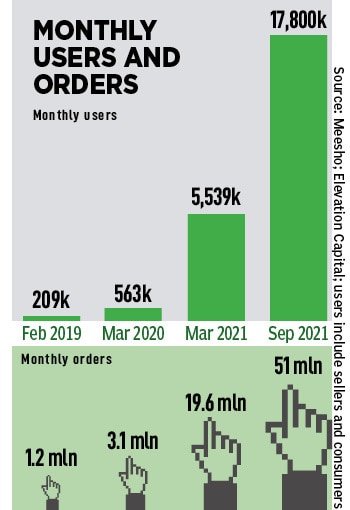 What made Kabir Narang, founding general partner at B Capital Group, join the party was the way the startup was democratising ecommerce. He explains. The local craftsperson in Jaipur, the trader in Mumbai, and the neighbourhood store owner in Coorg were increasingly looking to leverage digital channels to grow. Meesho, he lets on, was helping small sellers benefit from the digital revolution. “This is the reason why we invested," he says, adding that Meesho has scaled to India’s largest reseller-based platform with positive unit economics. The startup has leveraged its scale to enable low-cost fulfilment at zero commissions for their suppliers, helping them come online. It set the flywheel at an even faster pace by expanding to serve direct consumers early this year. “Meesho has been trending as one of the top apps in Google Play Store," he says.
What made Kabir Narang, founding general partner at B Capital Group, join the party was the way the startup was democratising ecommerce. He explains. The local craftsperson in Jaipur, the trader in Mumbai, and the neighbourhood store owner in Coorg were increasingly looking to leverage digital channels to grow. Meesho, he lets on, was helping small sellers benefit from the digital revolution. “This is the reason why we invested," he says, adding that Meesho has scaled to India’s largest reseller-based platform with positive unit economics. The startup has leveraged its scale to enable low-cost fulfilment at zero commissions for their suppliers, helping them come online. It set the flywheel at an even faster pace by expanding to serve direct consumers early this year. “Meesho has been trending as one of the top apps in Google Play Store," he says.
Back in 2015, what trended for Aatrey and Barnwal was a spate of investor rejection. “We met each and every VC in India," recalls Aatrey. Nobody, he rues, understood how a large business could be built by catering to homemakers. While some saw zero potential in the business, others labelled it as niche. Then there were others who mocked at the stupidity of two men to figure out what women want! Every investor kept declining, but the gritty founders kept chasing them. “We were perhaps the most rejected startup by Elevation," smiles Aatrey.
What helped Aatrey survive a series of failures and rejections was having a co-founder in Barnwal. “You realise the value of partnership whenever you are down," he says. What also uplifted the mood of the friends was a fearless mindset. “When you are 24, you don’t think about the downside in life," he says. “We had nothing to lose." The friends were convinced that if their entrepreneurial venture bombed, they would find some job. “So every single time we failed, we reminded ourselves that we have nothing to lose," he says.
Now that Meesho has scaled admirably and is also a strong decacorn (valuation of $10 billion or more) candidate, does the fear of downside bog Aatrey? The co-founder stays fearless. “I will keep taking bold bets," he says, alluding to the zero percent seller commission that it rolled out this year, and the grocery gambit. He explains the mindset. A lot of people do not take bold bets because they fear failure. “And most don’t innovate because of this reason," he underlines, adding how Meesho has been transforming from a social commerce to an internet commerce player.

Over the last year or so, Meesho has become a horizontal platform that has everything starting from fashion, lifestyle, beauty, personal care and grocery. In fact, the share of consumers on the platform has become higher than entrepreneurs. “We want to become one-single destination for the next billion people to come and buy everything they want in their household," he says.
The ecommerce move, interestingly, pits Meesho directly against the likes of Amazon and Flipkart. Aatrey, though, doesn’t see any threat. While others stayed focussed on branded products and top cities, Meesho has been relentless in wooing consumers and sellers across Tier II and beyond. The challenge for the startup, he points out, would be to keep up the pace of expansion, and execution.

Another big challenge, point out industry observers, would be to also monetise at a fast pace. Though Aatrey reckons that the startup has been doing its bit to beef up revenue, he declined to share the financials for FY21. Meesho reportedly posted a revenue of Rs341.6 crore in FY20, a jump of over four times from Rs84.8 crore in FY19. The loss increased to Rs315.4 crore from Rs100.42 crore in FY19. “One thing Meesho should keep in mind is that even Flipkart and Amazon are not profitable after so many years," says a VC, requesting anonymity. Hefty valuation doesn’t mean equivalent growth in topline or an insulation from a bleeding bottom line. “It’s good to scale fast, but it’s smart to scale in a sustainable manner," he says, sounding a word of caution.
Aatrey, for his part, stays fearless. “We will never be afraid to take bold steps," he signs off.
First Published: Nov 11, 2021, 15:06
Subscribe Now